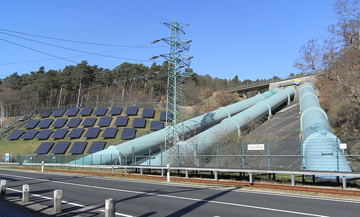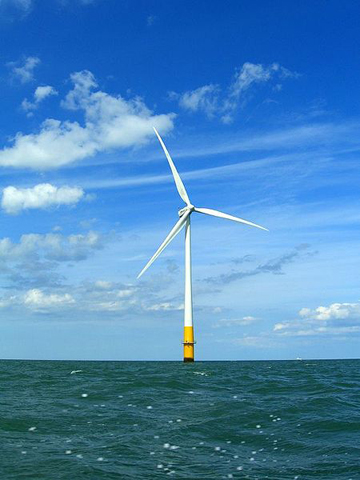When historians look back at the fight to combat climate change—not to mention the struggle to overcome our global addiction to fossil fuels—will 2011 be considered a watershed moment? Maybe. In the last couple months, three countries—each in the top ten in terms of GDP—have suddenly made major renewable energy promises. Germany, Japan, and, just today, Britain are giving speeches and producing plans that, if successful, could be the global tipping point needed to move beyond fossil fuels to, one day, a world run entirely on green.
Germany
If this is truly the beginning of the energy shift that environmentalists have been advocating for years—and that’s a big ‘if’—the tragic twist to this story will be the connection between a brutal natural disaster and two government’s sudden embrace of aggressively—rather than languidly, some may even say sluggishly—going green.
On March 11th tragedy struck Japan in the form of a practically unprecedented 9.0 earthquake and subsequent tsunami. Over 15,000 perished (and probably more) while entire cities were decimated. But the immediate disaster toll wasn’t the only problem. The earthquake also lead to a full meltdown, only recently admitted, at Fukushima nuclear power plant, a crisis that is ongoing.
For Germany, which receives 25 percent of its energy from nuclear power, the meltdown at Fukushima may well be a game-changer.
 Energy park in Germany: solar on the left, hydro on the right. Photo by: Quartl. |
“It’s over. Fukushima has forever changed the way we define risk in Germany. We want to end the use of nuclear energy and reach the age of renewable energy as fast as possible,” Chancellor Merkel stated recently.
Merkel, who had only last year decided to extend the lifetime of its nuclear reactors, has now decided to phase out all 17 nuclear plants and move not to coal or natural gas, but renewable energy. While nuclear is considered by some as ‘renewable’ or ‘green’ due to its lack of carbon emissions, it obviously has significant drawbacks, from instability to an intractable waste issue. But the point here is not so much that Germany is moving away from nuclear, as it is moving wholly towards truly green energy: wind, solar, tidal, biomass, geothermal, etc.
In nine years it wants to double the share of renewable non-nuclear energy, reaching 35 percent of total energy consumption by 2020. Ten years later Germany hopes to half the country powered by renewables and over 80 percent by 2050.
Even without nuclear energy, Germany is still committed to slicing carbon CO2 emissions from 1990 levels by 40 percent in 2020 and more than 80 percent in 2050.
Such a push toward renewables in the heavyweight economy of Europe could be a game-changer for green energy businesses. Germany’s economy has also remained relatively robust in the face of the 2008 economic crisis, which makes it a focal point for investors abroad. The country already has a leg-up on green investment: in 2010, it had the 2nd highest investment in green energy (after China) with $41.2 billion, beating out number 3, the US, by nearly $10 billion. For its part, the US is falling far behind others in the green race.
Japan
Following the nuclear meltdown at Fukushima, Japan has announced it is scrapping plans for 14 new nuclear reactors and will begin weaning itself off nuclear power.
“Taking this as a lesson, we will lead the world in clean energy such as solar and biomass, as we take a step toward resurrection,” Prime Minister Naoto Kan recently said.
He has also stated that both renewable energy and increasing energy efficiency will be the two new ‘pillars’ in Japan’s energy policy.
Japan has already committed to reducing greenhouse gas emissions from 1990 levels by 25 percent by 2020, and 80 percent by 2050. But this means Japan will have to depend on renewable technologies, such as wind and solar, instead of nuclear if it’s to still meet its goals.
Kan has not given many specifics on his new energy plan, not surprising given he is still in the throes of a national nuclear crisis. But if Japan, the world’s number three economy, makes a quick switch to green, it would likely spur investment, interest, and enthusiasm around the world.
Britain
Today, Britain has announced that it is committing itself—legally—to cut greenhouse gas emissions by 50% in just over 15 years (by 2027) from 1990 levels. Conservative Prime Minister David Cameron accepted the view of his independent climate advisors, the Committee on Climate Change, that the UK required gutsy cuts to stay competitive in a global market as well as to meet its pledges.
 Kentish Flats wind power in the UK. Photo by: Phil Hollman. |
The UK is now the first country to accept legally binding targets that go past 2020, all the way to 2027 in this case.
“This is an outstanding example of the kind of action by developed world countries that’s needed to bring climate change under control,” Bert Metz, an adviser to the European Climate Foundation, a research body based in Brussels told the New York Times. “It’s also really going to push the British economy in the direction of growth.”
UK Energy Secretary, Chris Huhne, stressed that the goal would “establish our competitive advantage in the most rapidly growing sectors of the world economy.”
Unlike Germany and Japan, the UK does not view new nuclear as anathema after Fukushima, and a slice emissions reductions may be in the form of nuclear power, though its still unclear if the British public will accept more nuclear. However, among officials wind, especially off-shore, is seen as the holy grail of green energy in the UK.
Going forward
So, the question is will Germany, Japan, and the UK actually stand by their promises to push toward a renewable revolution?
Germany’s about-face was so rapid, and surprising, that a falling back would not be unexpected; Japan is vague on the details; and the UK snuck in a get-out-of-green clause that could undercut its pledge.
And even if these nations do succeed in moving rapidly to renewable will their subsequent lessons, know-how, and technology actually create a domino effect for the rest of the world?
Will China move quickly enough in its renewable ambitions? Will the US still staunchly refuse to address climate change? Will Canada continue to undercut climate negotiations?
So far naysayers have said a green revolution is simply too costly, especially in hard economic times. However, proponents argue that going green would boost both the economy and jobs. In fact, they say a green economy may move the world beyond the economic slump.
 Solar power trough in the US. Photo by: Sandia National Laboratory. |
However, the stakes are even higher than current political debates usually paint. Scientists and economists say the costs of not going fully green become far higher—and a lot severer—in the future as the effects of climate change, already gravely visible, worsen. Well-established impacts of climate change—rising sea levels, worsening droughts, severe floods, melting polar regions, mass extinction, expanding disease range, megafires—are practically incalculable for future society.
Scientists and futurists have long predicted that eventually society would be entirely run on renewable non-polluting energy—such as the sun—creating a healthier (significantly less pollution), more just (no more oil conflict), more democratic (the sun shines and the wind blows on everyone), and less climatically instable world.
Could it be that Germany, Japan, and UK may be the first to make this dream a reality? Will 2011 be a watershed for global society? Only the future can tell.
Related articles
Clean energy investments rise 630% in 7 years
(03/29/2011) According to a report by the US Pew Environment Group global clean energy investments, which do not include nuclear power, jumped 630% since 2004. The report detailing 2010 clean energy investments found that China remains the global leader in clean energy, while the US fell from 2nd to 3rd. This is the second year in a row that the US fell: in 2009 it lost first place to China. In all $243 billion were invested in clean energy in 2010.
2% GDP could turn global economy green
(02/21/2011) Investing around $1.3 trillion, which represents about 2% of the world’s gross domestic product (GDP), into ten sectors could move the world economy from fossil-fuel dependent toward a low carbon economy, according to report by the UN Environment Program (UNEP). In addition, the investments would alleviate global poverty and keep stagnating economies humming, while cutting humanity’s global ecological footprint nearly in half by 2050 even in the face of rising populations.
With pressure to drill, what should be saved in the Arctic?

(04/27/2011) Two major threats face the Arctic: the first is global climate change, which is warming the Arctic twice as fast the global average; the second is industrial expansion into untouched areas. The oil industry is exploring new areas in the Arctic, which they could not have reached before without anthropogenic climate change melting the region’s summer ice; but, of course, the Arctic wouldn’t be warming without a hundred years of massive emissions from this very same industry, thus creating a positive feedback loop that is likely to wholly transform the Arctic.
Gas from ‘fracking’ not climate friendly
(04/13/2011) It appears every time a fossil fuels industry claims its energy is ‘green’ or ‘climate-friendly’, scientists discover this just isn’t so. The most recent culprit is natural gas produced by an already controversial method known as hydraulic fracturing, or fracing, which extracts the gas from shale basins. A new study in Climatic Change has found that the process of fracing is worse than coal over a 20-year period and about equal over 100-years. Coal had long been considered the worst climate offender of all energy options.
World Bank proposes to limit funding to coal plants
(04/05/2011) Following years of criticism from environmentalists and some governments the World Bank has proposed new rules regarding carbon-intensive coal plants, reports the Guardian. The new rules would allow lending for coal-fired plants only to the world’s poorest nations and would only lend after other alternatives, such as renewable energy, had been ruled out.
US approves first deepwater drilling in Gulf since BP disaster as oil tar balls reappear on coast
(03/22/2011) Yesterday the US Bureau of Ocean Energy Management, Regulation and Enforcement awarded Royal Dutch Shell PLC the first deep-water exploration permit since the BP disaster last year, which sent some 4.9 million barrels of oil and up to 500,000 tons of methane into the Gulf of Mexico over three months.
Photo gallery: Borneo paradise saved from beachside coal plant

(02/22/2011) Last week the Malaysian government announced it had canceled a plan to build a coal-fired plant in the state of Sabah. The coal plant would have rested on a beach overlooking the Coral Triangle, one of the ocean’s most biodiverse ecosystems, and 20 kilometers from Tabin Wildlife Reserve, a rainforest park home to endangered orangutans, Sumatran rhinos, Bornean elephants, and thousands of other species. The cancellation followed a long campaign by a group of environmental and human right organizations dubbed Green SURF (Sabah Unite to Re-power the Future), which argued that the coal plant would have imperiled ecosystems, ended artisanal fishing in the area, hurt tourism, and tarnished Sabah’s reputation as a clean-green state.
Coal’s true cost in the US: up to half a trillion
(02/20/2011) According to the global market coal is cheap, yet a new study in the Annals of the New York Academy of Sciences finds that the hidden costs of coal are expensive, very expensive. Estimating the hidden costs of coal, such as health and environmental impacts, the study found that burning coal costs the US up to $523 billion a year. Dubbed ‘externalities’ by economists, the paper argues that these costs are paid by the American public.
Is Obama’s clean energy revolution possible?
(01/26/2011) Last night US President Barack Obama called for a massive green energy make-over of the world’s largest economy. Describing the challenge as ‘this generation’s Sputnik moment’ the US president set a goal of producing 80 percent of America’s energy by clean sources by 2035. While this may sound improbable, two recent analyses back the president up, arguing that a global clean energy revolution is entirely possible within a few decades using contemporary technology and without breaking the bank. “Based on our findings, there are no technological or economic barriers to converting the entire world to clean, renewable energy sources,” Mark Z. Jacobson, a professor of civil and environmental engineering at Stanford said in a press release. “It is a question of whether we have the societal and political will.”
U.S. Department of Energy makes $1.5B loan to massive solar plant
(12/30/2010) The U.S. Department of Energy has finalized a guarantee to provide a loan of $1.45 billion to Abengoa Solar Inc. which will fund the world’s largest parabolic trough concentrating solar plant. The plant is expected to serve 70,000 households and avoid 475,000 tons of carbon dioxide emissions per year.
Oil, indigenous people, and Ecuador’s big idea

(11/23/2010) Ecuador’s big idea—potentially Earth-rattling—goes something like this: the international community pays the small South American nation not to drill for nearly a billion barrels of oil in a massive block of Yasuni National Park. While Ecuador receives hundred of millions in an UN-backed fund, what does the international community receive? Arguably the world’s most biodiverse rainforest is saved from oil extraction, two indigenous tribes’ requests to be left uncontacted are respected, and some 400 million metric tons of CO2 is not emitted from burning the oil. In other words, the international community is being asked to put money where its mouth is on climate change, indigenous rights, and biodiversity loss. David Romo Vallejo, professor at the University of San Francisco Quito and co-director of Tiputini research station in Yasuni, recently told mongabay.com in an interview that this is “the best proposal so far made to ensure the protection of this incredible site.”
US elects barrage of climate change deniers, threatening support for green energy
(11/03/2010) The US midterm election, which won Republicans the House but safeguarded the Senate for Democrats, has brought in a number of self-proclaimed climate change deniers, ending any likelihood that an energy bill will be passed over the next two years and essentially stumbling the White House’s strategy on climate change. Newly elected Republican Senators Rand Paul of Kentucky and Marc Rubio of Florida, both members of the nascent Tea Party, have stated they do not believe in climate change despite that scientists overwhelming agree the Earth is warming due to human impacts.














